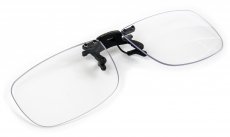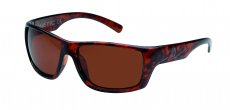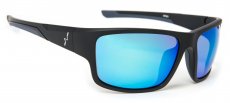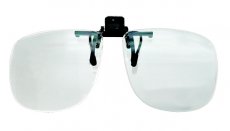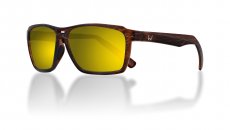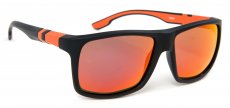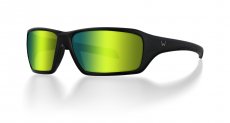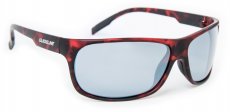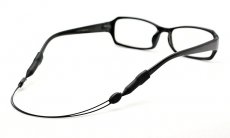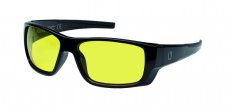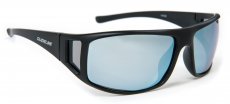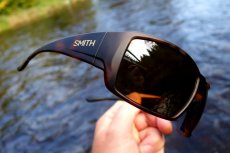Those who have tried polarized glasses while fishing usually don't want anything else. No wonder! Thanks to the polarizing filter, we can partially see below the water surface, which is often the key to a successful fishing trip. But what solution should you choose when your eyesight deteriorates?
What is polarization?
Let's start with a little theory. The polarizing filter on the glasses blocks horizontal light waves that are reflected from surfaces such as water, snow or roads. Vertically reflected waves, on the other hand, allow us to see colors and contrast. A polarizing filter allows vertical reflected waves to pass through, but does not allow horizontal light waves to reach our eyes. This minimizes glare and improves visibility. And not only when looking under the water surface. Today, polarized glasses are in great demand for everyday use, driving, cycling, mountain hiking, skiing, etc. The glare minimization effect is very comfortable for our eyes, it improves visibility in most light situations and reduces the strain on our eyes.
Not just for fly fishermen!
Although the use of polarized glasses is very wide, in this article we will focus mainly on fishermen. Those fishermen who have not yet tried polarized glasses do not know what they are missing. The basis is the possibility of looking under the water surface (thanks to the limitation of the reflection of the sun's rays from the water surface). Often this advantage can be the deciding factor for a successful catch across fishing techniques. When fly-fishing or spinning, you can see below the surface of the water, so you can locate the fish. When you wade through water, you can better see obstacles or rocks below the surface of the water, and you can significantly reduce the risk of drowning. When float fishing or using a feeder, polarized glasses will help you monitor the antenna of the float or the tip of the feeder on sunny days, when the sun's rays reflect off the surface of the water and make comfortable fishing uncomfortable. Carp anglers and catfish anglers will use polarized glasses especially when locating fish and obstacles below the water surface. Or while relaxing on a deckchair. 😅
Color of polarized lenses
Each color has its own specific properties and possibilities of use. In general, we can say that the darker the polarized glasses, the better the polarization effect. On fully sunny days, it is the ideal solution. If the lighting conditions change, it may happen that the dark polarized glasses will fulfill their effect too much in a temporarily cloudy sky and you will see too dark thanks to the dark lenses. Therefore, it is advisable to choose the color of the polarized glasses according to the situations in which you want to use them. You can find more about choosing the right color in the article: "Choosing the right fishing sunglasses".
UV protection in the first place
When choosing sunglasses or polarized glasses, you should always keep in mind that UV protection for your eyes should be the most important factor in your choice. That is why we recommend choosing glasses from tested and certified manufacturers. Buying cheap glasses at the flea market can save your wallet, but you really have no idea how much protection these glasses provide for your eyes. Therefore, in CzechNymph offer you will only find polarised glasses from proven manufacturers such as Smith Optics - the leading manufacturer of polarized glasses in the world. The price is rather slightly higher than the competition, but the quality of processing, protection against UV radiation and the polarizing filter are at the highest level. You can read more about Smith Optics glasses in the article "SMITH! Simply the best polarized glasses". And speaking of UV protection, don't underestimate clothing with sufficient UV protection and a high UPF factor in the summer months.
Classic polarized glasses
If you are one of the lucky ones who can see like a lynx, choosing polarized glasses is quite easy for you. Nowadays, the range of quality glasses is very wide. You choose the color, the type, you try it on, it fits your eyes, you pay, you leave satisfied. However, if you have an eye defect or your vision has gradually deteriorated, the solution is a little more complicated.
Magnifying clips
One option is dioptric magnifying clips. If you suffer from farsightedness (difficulty seeing up close), you can attach a magnifying clip to your regular polarized glasses. The lenses provide a sharp, distortion-free view. Just put them on the nose part of the polarized glasses, flip the lenses up and down for an easy transition between the polarized glasses and these magnifying lenses. They are great for "titre" work when you need to change or tie flies etc. They are a relatively cheap solution. If you own classic polarized glasses and your near vision has deteriorated over time, you don't need to replace the polarized glasses right away, you just start using magnifying clips for close up.
Polarizing clips
These clips work on the same principle as magnifying clips, except that you use your prescription glasses to which you attach the polarizing clip. The advantage is relatively low financial cost, simplicity of acquisition and use. The disadvantage is the fact that you have two glasses behind you. Because of this, various reflections of light rays occur between glasses and the use of this solution is not always optimal. Especially in earlier times, this solution was very popular with fishermen. Nowadays, it is more likely to be replaced by the more modern options listed below.
Prescription glasses with magnetic polarization clip
Special prescription glasses work in a similar way to polarizing clips, to which you attach polarizing clips using a magnet. This type of glasses is available in optics. You buy prescription glasses according to your health requirements, and at the same time you get a polarizing clip in the set that fits exactly to the given glasses, to which it is attached using a built-in magnet on the outer upper corners of the glasses frame. These polarizing clips are available in different lens colors. Sometimes there are several colored glasses in the package. With this solution, you partially eliminate the problem of "two glasses in a row", since the dioptric lens closely follows the polarizing clip. The reflection of light rays still exists between the glasses to some extent, but it is nothing major. It's a bigger problem when you get your hand or fishing tackle in the way of the glasses and clip. Although it holds relatively firmly on the glasses thanks to the magnet, it can still happen that you drop the clip from the glasses. For example, when wading or using a boat, this can mean a problem. But the advantage is the fact that you can usually buy these spare magnetic clips separately, so even such a situation has a solution.
Glasses with dioptric polarized lenses
The last and at the same time the most expensive variant are dioptric polarized lenses. They are suitable for those of us who suffer from myopia (difficulty seeing at a distance). You can buy such glasses at an optician. Just choose the right frames. You can choose either from classic frames for prescription glasses, or from special frames designed specifically for sunglasses. Of the options mentioned above, this is probably the most optimal option, because you only have one lens (classic dioptric lenses do not overlap with polarizing filters). However, even this solution has one disadvantage, namely the need to constantly carry two glasses with you. If you have no eye defect, when the sun goes down, you take off the polarized glasses. If you use glasses with dioptric polarized lenses, you must change these glasses to the classic dioptric ones that you normally use. But it is a relatively small tax for "full-fledged polarized glasses". In addition, if you choose a more universal lens color (lighter shades of brown or gray), you can wear these glasses for the whole fishing even when the lighting conditions change.









